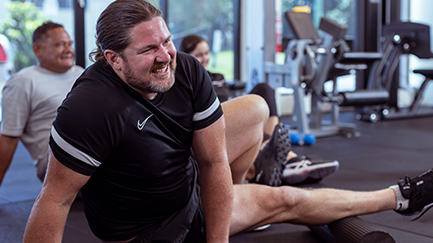
Supporting veterans through service related injuries
The Mates4Mates physical rehabilitation team is here to help veterans improve mobility, manage pain and enhance their overall wellbeing.

The unique experience and training provided by military service can make managing personal relationships challenging for both veterans and family members.
So, how do you recognise unhealthy behaviours in relationships?
What are some unhealthy behaviours in relationships?
It is important to note that relationships do not only relate to romantic ones but also include relationships with friends, family, coworkers and other people in our lives.
Signs of unhealthy behaviours in personal relationships can include:
Veterans and struggling with healthy relationships
With long periods of time spent away from family and friends, and specific communication techniques learnt in the Defence Force that may not translate well in civilian settings, at home or at work, current and ex-serving military personnel may find unhealthy behaviours develop within their relationships.
It is important to recognise when these communication barriers are present in your everyday connections to better work toward establishing healthy patterns of behaviour within relationships.
Where to start in managing healthy relationships
For veterans and families working toward creating healthier relationships, a great place to start is understanding your communication style. How do you speak to each other? Is it respectful?
A pillar of respectful communication is treating others as you wish to be treated. By identifying where you can better respect and consider the needs and views of others, you begin the journey toward healthier relationships. This helps by allowing us to work through conflict in a respectful and collaborative way, using effective negotiation, compromise, and understanding.
Seeking support to build healthy relationships
Social workers and counsellors may be trained to provide support to those looking to improve their interpersonal relationships, for example by developing respect and improving communication skills. They can work with couples and individuals to determine if they would benefit from specialist couples counselling sessions.
Working with a clinician can help veterans, and partners of veterans, by raising their awareness of destructive and unhelpful behaviours and recognising where these barriers may exist in their own relationships.
Social workers and counsellors can also provide techniques and strategies to individuals to assist in repairing, building and maintaining healthier, more respectful, and resilient relationships.
Support at Mates4Mates
Mates4Mates offers veterans and families access to psychologists, counsellors, and social workers who can provide support in working through relationship issues.
The Mates4Mates Healthy Relationships Program is also delivered online multiple times throughout the year. This program covers topics such as the difference between healthy and unhealthy relationships, addressing unhealthy behaviours, and how to navigate changing unhealthy behaviour patterns to develop healthier, more respectful relationships.
For more information about Mates4Mates services and how we can help to support you, reach out to us on 1300 4 MATES (62 837) for a confidential chat.
National Support Hotlines
1800 RESPECT: 1800 737 732
Lifeline: 13 11 14
Open Arms: 1800 011 046
Men’s Referral Service: 1300 766 491
Mensline Australia: 1300 789 978
Kids Helpline: 1800 551 800
Relationships Australia: 1300 364 277
Aboriginal Family Domestic Violence Hotline: 1800 019 123 or 13YARN (139 276)
Australian Childhood Foundation: 1800 176 453
Written by Christine Brabrook, Mates4Mates Social Worker

The Mates4Mates physical rehabilitation team is here to help veterans improve mobility, manage pain and enhance their overall wellbeing.